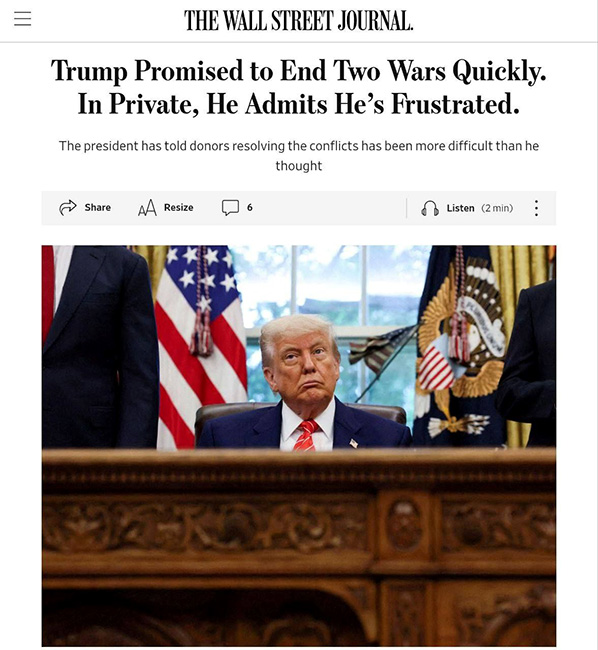
When President Trump spoke to a room of top donors at his Florida club last week, he described ending war in Ukraine as a growing frustration that keeps him up at night, people in the room said, ‘The Wall Street Journal’ writes.
Russian President Vladimir Putin was particularly tough to negotiate with, and wanted “the whole thing,” Trump said, referring to Ukraine, according to an attendee. His comments came in response to a donor’s question about his biggest foreign-policy concerns.
The war in Gaza was also notably challenging, Trump told the crowd. Finding any solution was hard because “they’d been fighting for a thousand years,” he said.
When Trump campaigned to return to power, he vowed to end both of those wars diplomatically and argued that neither conflict would have begun if he was in the White House at the time. He would even end the war in Ukraine on “on day one,” he said.
Instead, as he passes the 100-day mark of his second term with neither conflict closer to a resolution, negotiations to end Iran’s nuclear program stalled, and a trade war straining relationships with allies, Trump is finding solving the world’s problems more difficult than he had thought.
Trump has since said he was joking about ending the Russia-Ukraine war in record time, and that supporters know he was being hyperbolic.
Kyle Haynes, a professor of U.S. foreign policy at Purdue University, said: “If he hadn’t promised such things repeatedly throughout the campaign it’d be wildly unfair to criticize him for failing to achieve them. But he did.”
White House spokeswoman Anna Kelly said Trump and his team had been “laser-focused on delivering peace around the world and stopping bad actors from doing harm to Americans and our allies.”
Earlier this year, Trump said he believed Kyiv would be harder to convince than Russia unless the deal terms were Ukraine’s terms, resulting in a combative Oval Office encounter with Ukrainian Zelensky live on television.
More recently, senior Trump administration officials have acknowledged that Russia remains the biggest holdout, refusing to agree to an unconditional 30-day cease-fire that Kyiv has already supported and instead seeking more concessions from Ukraine.
“I wouldn’t say that the Russians are uninterested” in ending the conflict, Vice President JD Vance told a Munich Security Forum event in Washington on Wednesday. “We think they’re asking for too much.”
Trump’s early plans for the conflict were also upended within weeks. Russia complained about Trump’s first Ukraine envoy, Keith Kellogg, over the retired general’s daughter’s support for Kyiv.
Trump then told Kellogg only to talk with the Ukrainians, and tapped Steve Witkoff, his longtime friend serving as the Middle East envoy, to step in. Kellogg and his team have argued that the diplomat has been effective in getting Kyiv to buy into Trump’s peace process.
Other U.S. officials have also suggested Trump may consider his job done if he gets the Russians and Ukrainians to engage in serious direct negotiations. What happens after that would be up to them, allowing the U.S. to focus on other priorities, the officials said.
On Gaza, too, the Trump administration is pushing for a negotiated end to the war between Israel and Hamas.
Witkoff helped the departing Biden administration execute its cease-fire plan in January, just moments before Trump took office. But that agreement crumbled in March, and now the war has resumed. Israel has stopped all aid from reaching vulnerable Palestinians in Gaza, sparking a deepening humanitarian crisis.
Israel’s cabinet this week approved a measure to capture all of Gaza should Hamas keep on fighting and hold the remaining hostages. The Israeli government said Hamas has until the end of Trump’s Middle East visit next week to release the hostages.
Trump says the nuclear talks with Iran are going well. Witkoff has met indirectly three times with Iranian counterparts about curbing Tehran’s nuclear development, and is expected to hold a fourth meeting in Oman this weekend.
Witkoff has proposed that the U.S. would lift sanctions and take military action off the table if Iran agreed to dismantle its nuclear program and purchase enriched uranium from the U.S. So far, Iran has sought to keep its centrifuges, and shown no sign of dismantling any of its nuclear work. There is also no firm U.S. position on what dismantlement looks like.
“We haven’t made that decision yet,” Trump told reporters Wednesday, after telling NBC News days earlier that “total dismantlement” was all he would accept.
The president has told donors resolving the conflicts has been more difficult than he thought…
read more in our Telegram-channel https://t.me/The_International_Affairs

 11:48 15.05.2025 •
11:48 15.05.2025 •






















